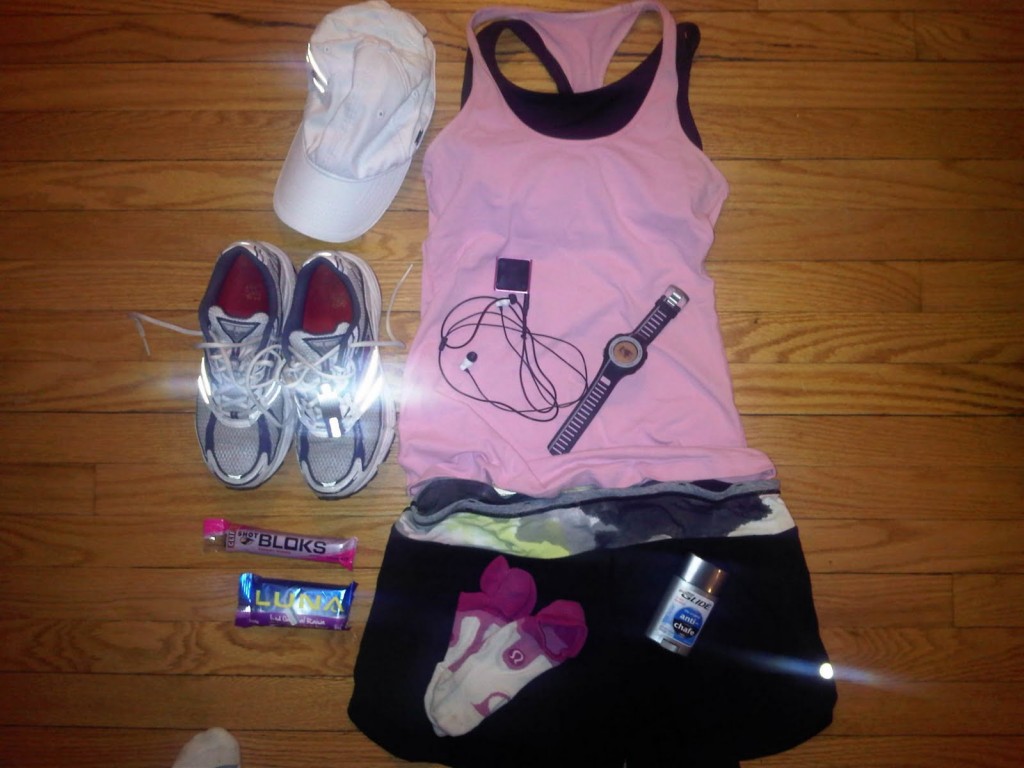Hi A Healthy, Happier Bear readers. My name is Amy and I’m a marathoner from Washington, DC, blogging at Welcome to Boston.
 I was so excited when Ashley asked me to write a guest post for the Marathon + Moderation series as I’ve spent the better part of the past year shifting my mindset about running from 100% outcome-focused (i.e. time), to 100% process-focused (i.e. just letting myself run), to a healthy balance of the two. With a March 17 marathon on the schedule, I hoped that I’d be able to share with you how I finally accomplished the latter in a marathon (I’d done it in a ½ marathon last fall) and ran a kick ass BQ race in the process. Well, the weather had other plans as temps climbed into the 70s without a cloud in the sky. Instead I took my first DNF ever in a race and in doing so learned an unexpected lesson about moderation that actually proved that I’d achieved that balance even better than a successful race would have.
I was so excited when Ashley asked me to write a guest post for the Marathon + Moderation series as I’ve spent the better part of the past year shifting my mindset about running from 100% outcome-focused (i.e. time), to 100% process-focused (i.e. just letting myself run), to a healthy balance of the two. With a March 17 marathon on the schedule, I hoped that I’d be able to share with you how I finally accomplished the latter in a marathon (I’d done it in a ½ marathon last fall) and ran a kick ass BQ race in the process. Well, the weather had other plans as temps climbed into the 70s without a cloud in the sky. Instead I took my first DNF ever in a race and in doing so learned an unexpected lesson about moderation that actually proved that I’d achieved that balance even better than a successful race would have.
I know what you’re thinking – a DNF? Well, I had a few minutes where the only thing I thought about with respect to the DNF was that I was giving up. One thing is for sure, I am not a quitter and hated even the idea of it. Staying mentally strong in races was part of my learning about the process and I had just completed a fall season full of proving how well I could push through. But as the miles ticked on (5 more of them to be exact), I realized that taking the DNF wasn’t quitting. I was not in the race to finish and it simply wasn’t worth trashing myself for a race result that was nowhere near my ability. I knew that if I stopped that I’d be able to recover in time to run another race a few weeks later. And so I pulled myself off the course at mile 18, gave myself 10 minutes to be upset, another 10 minutes to be angry and then sailed right into the greatest relief I’ve ever felt. Another one of my teammates stopped too, and our coach was thrilled with our smart decision.
Smart…hmmm. I had to think about this a lot over the few days after the race and it wasn’t until recently that it all came together for me. The running culture, especially the one that lives in the blogosphere encourages a more is better mindset. As people post their training schedules, workout recaps and race plans, they’re inadvertently bringing out a competitive drive in others to go out and do the same thing. Similarly, in races, there’s a notion out there that you’re not mentally strong if you slow down, or worse stop running, especially if you’re not injured.
While our coach has always preached volume as a key part of marathon training, he also has always said that everyone should do the most that they can without breaking down, and this amount is different for everyone. In addition to that, we use a pace chart, similar to McMillian, as a guide to ensure that we’re not racing our workouts. In all cases, if we’re hurt, struggling or generally just not having a great day, we’re told that the smarter decision is to bag it (and do the workout in the pool). For me, this has also translated into not working off a set a stone training plan. I go week to week based on what our coach has scheduled, hitting the number of miles and paces that feel right v. what’s on paper.
I didn’t get it until that day, but why should a race be any different? Like training volume, we need to go hard in our races and push ourselves to do well. However, it’s under the tenant of starting slow and finishing fast. It’s using moderation to propel something amazing, right up to the limit (and maybe just beyond) of what we’re capable of doing. In the case of my most recent marathon attempt though, I would have had to go waaaay over that limit and then some just to run a mediocre race. I would have put my body in a position where I would have needed weeks to recover before even thinking about starting again. Instead though, I cut it short, gave myself a few days to bounce back, and now am 3 weeks into a short 7-week cycle leading up to my next one. I feel fantastic.
So, let’s get back to the balance of process and outcome. I may or may not have made the same decision re: pulling out of the race if I had been more process- or outcome-focused overall. I actually have no idea, and don’t think it matters. The thing I do know though is whatever decision I made would have been for the wrong reasons. A more outcome-focused me might have stopped simply because I wasn’t going to hit the time, and then I would have felt like I had given up, pouted about it for a while, and let it really rattle my confidence, wondering why I wasn’t capable of running my goal time. A more process-focused me might have kept going just for the mental experience of it all, even if I was sacrificing opportunities to race well later in the season. Instead, I remained in the middle, and in doing so feel like I have a good sense of when to push and go for a time goal, and when to pull back so that I can hit that time goal later on. This balance has catapulted my running to the next level. I can’t wait to get back out there on May 6 to see what I can really do with it.









